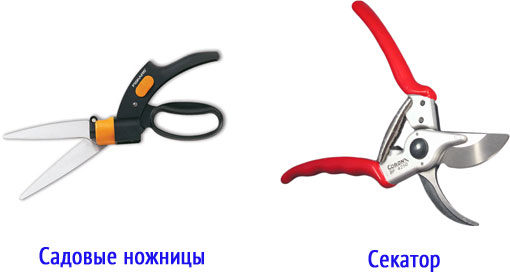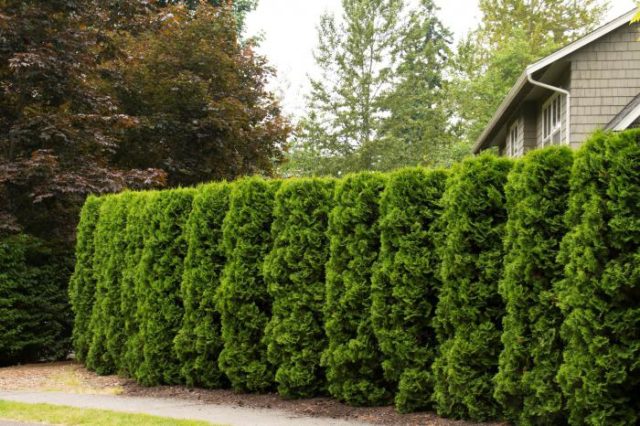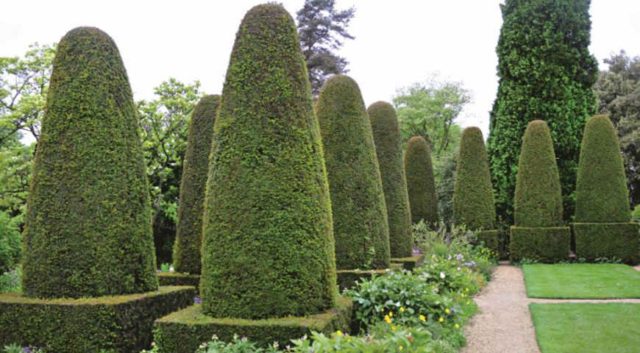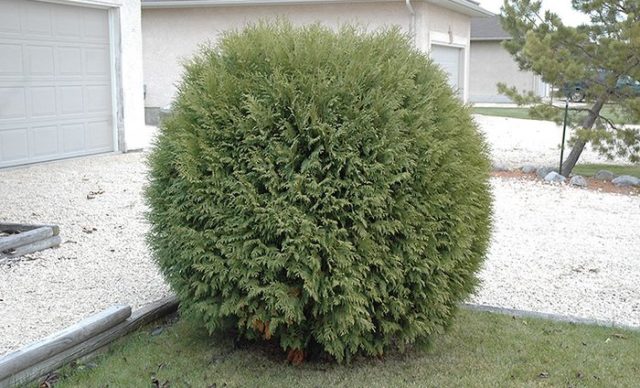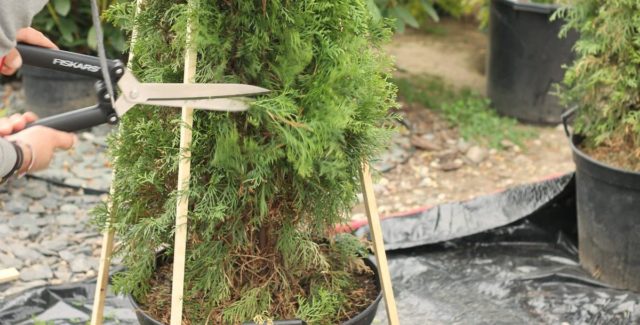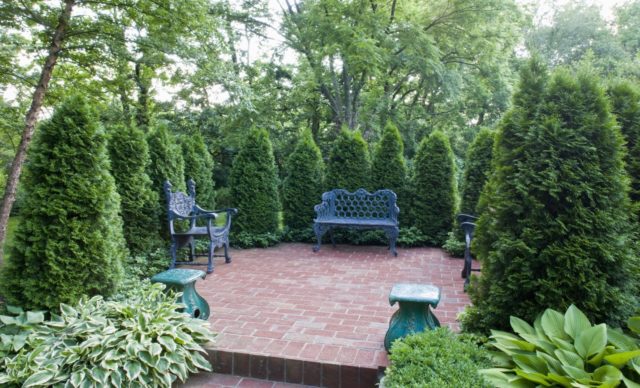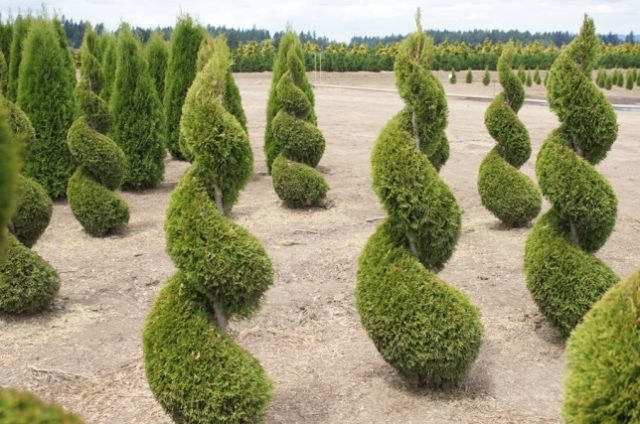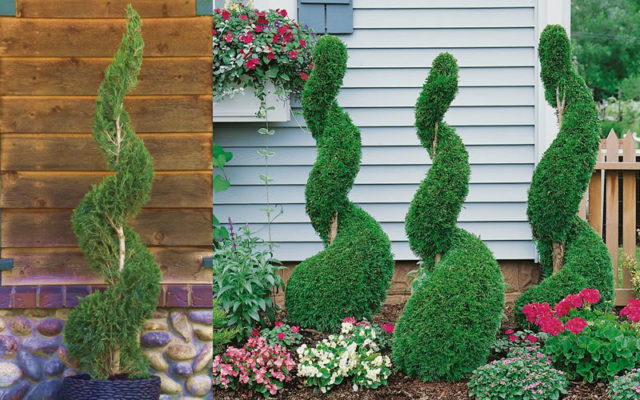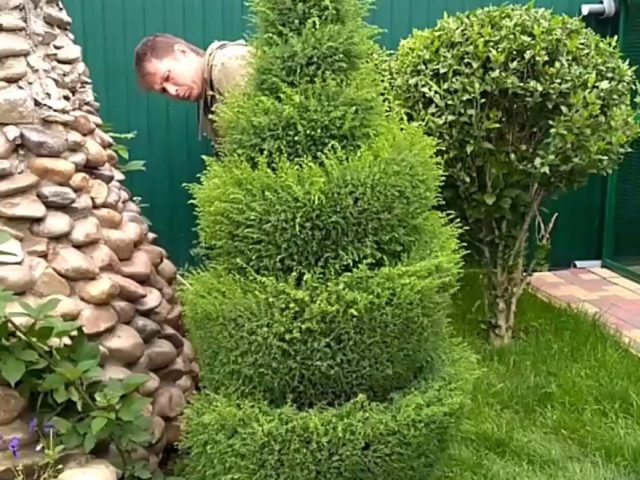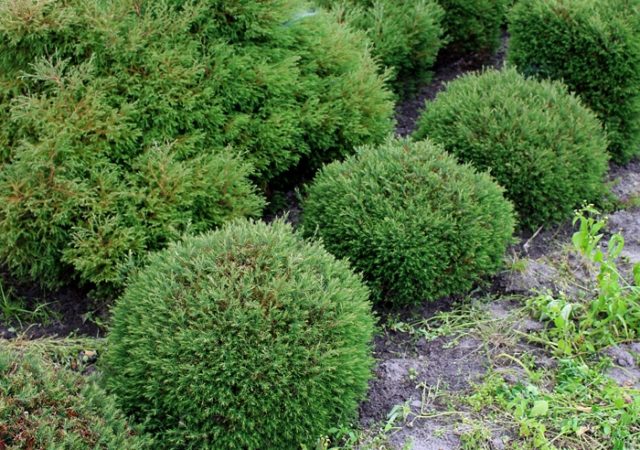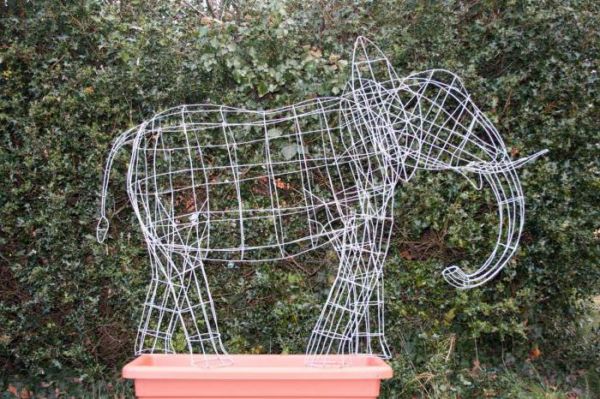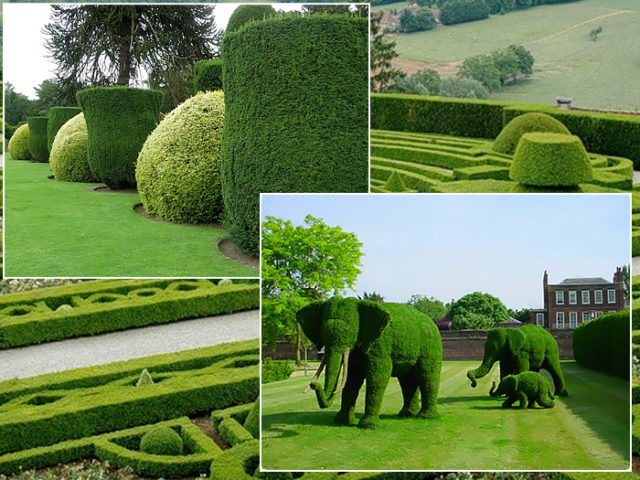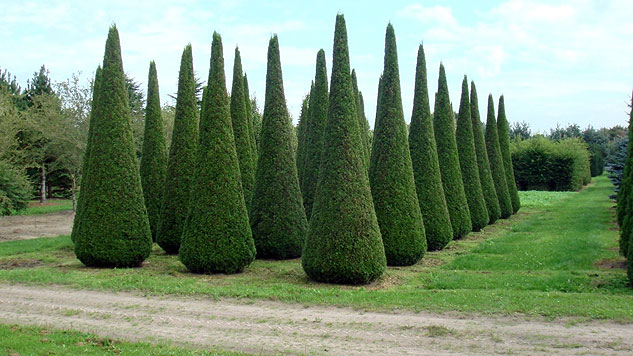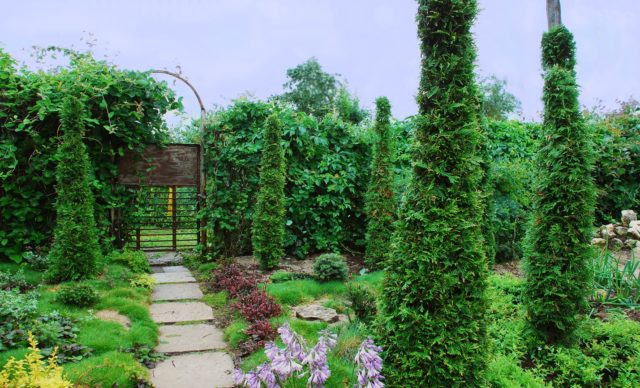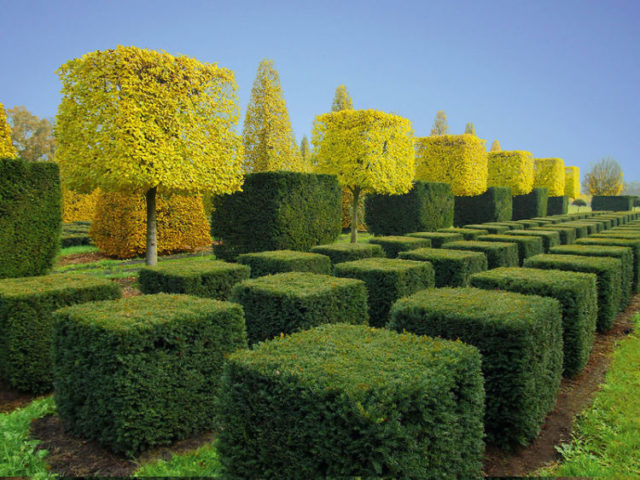Content
- 1 Is it possible to trim thuja
- 2 Types and tasks of pruning thuja
- 3 When can you cut thuja: in spring or autumn
- 4 Preparation of tools and materials
- 5 How to cut thuja in the spring
- 6 Decorative forms of pruning thuja
- 7 Is it possible to cut the top of a thuja
- 8 How to cut thuja for the winter
- 9 Thuja care after haircut
- 10 Conclusion
The unpretentious thuja has long won the hearts of gardeners with its stamina and luxurious appearance. Not only competent care, but also timely pruning of thuja will help to maintain and increase the beauty of this plant.
Is it possible to trim thuja
When asked whether it is possible to cut a thuya, the answer definitely needs to be: yes. This plant is among those who, when properly carried out pruning, not only does not harm, but also benefits, favorably influencing the development of shoots and crown density. Cutting these conifers has several goals:
- cleansing the crown from dead needles;
- getting rid of sick injured branches;
- thinning of an excessively dense crown;
- limiting the unwanted growth of needles;
- the formation of a certain silhouette from the needles.
Timely decorative pruning and crown formation helps to preserve the decorative qualities of thuja for a long time and present them favorably in the landscape design of the site. Different varieties of western thuja require an individual approach. Cone-shaped or columnar varieties are sheared at different frequencies, which depends on the speed of plant growth:
Variety | Annual growth rate | Pruning frequency per year | |
In height | wide | ||
Brabant | 35 cm | 15 cm | 2 times |
Emerald | 10 cm | 5 cm | 1 time |
Columna | 20 cm | 10 cm | 2 times |
Wagneri | 10 cm | 5 cm | 1 time |
Holmstrup | 12 cm | 4 cm | 1 time |
Globular conifers have an even lower growth rate, so they can be cut even less often, caring only about sanitary cleaning of the crown. As with all varieties of thuja, it should be carried out 2 times a year.
Types and tasks of pruning thuja
As already noted, there are 2 types of thuja pruning:
- sanitary;
- decorative or formative.
Sanitary pruning is essential for all varieties of this plant for healthy development. During this procedure, yellowed needles are removed from the surface of the crown and near the trunk so that pests and fungi do not start on the thuja. Also, with sanitary pruning, they get rid of dry and damaged shoots, which makes the crown of the ephedra thicker and more beautiful.
Formative pruning is not essential for plant well-being, but serves aesthetic purposes. They resort to it when they want to reduce the growth rate of a tree and give it the desired shape.
When can you cut thuja: in spring or autumn
The key to successfully maintaining the decorative qualities of the thuja and its health lies in carefully planning the timing of pruning. The optimal time for the procedure depends on the type of this ephedra and the purposes for which it is carried out. So, sanitary pruning of thuja is carried out at least twice a year: the first time - in the spring and the second - with the arrival of autumn. Spring treatment of plants is aimed at removing dried and frozen shoots during frost and subsequent activation of plant growth. Mowing trees in autumn, in turn, serves to facilitate their wintering.
As for the decorative formation of the crown, it is carried out from late April to mid-August.Later trimming can damage the flower buds that are laid on the tops of the thuja shoots in early autumn. And this will be fraught with a lack of growth and flowering next year.
Preparation of tools and materials
While pruning a thuja may seem like a daunting task that requires expensive equipment, it is not necessary to have a wide range of tools to do it. The branches of the plant and its needles do not differ in particular thickness, and therefore even beginners in this business will need only two main tools:
- secateurs;
- gardening scissors.
The pruning shears are useful for thinning the tree crown and removing branches, while the garden shears will help smoothly trim the shoots and give them the desired silhouette.
Among the latter, mechanical and electrical models are distinguished. Which scissors are best for everyone should decide for themselves, however, based on the experience of gardeners, it is worth noting that an electric tool is most suitable for professional pruning of numerous plantings. If thuja grow on the site in small quantities, mechanical shears should be preferred.
In addition to pruning shears and scissors, some growers use a sickle, with which you can cut the thickest branches of the thuja. All of the above tools must be sharpened before cutting, since blunt devices can severely injure the crown of the thuja. After pruning trees, tools should be rinsed and dried thoroughly.
The procedure itself should be performed with gloves and a protective gown or apron, since thuja tends to release a resin that will be very difficult to remove if it gets on clothes.
How to cut thuja in the spring
To maintain the health of thuja and correctly carry out spring sanitary pruning, you need to familiarize yourself with the nuances of this procedure:
- For work, choose a day when the sky will be completely covered with clouds in order to avoid the appearance of burns on the cut thuja shoots. At the same time, the haircut schedule is planned so that it does not rain in the next few days.
- Immediately before the procedure, the ephedra is carefully examined for diseases and fungi. It is permissible to prune branches only on healthy thuja.
- In the process of pruning, they get rid of dry, injured, yellowed and diseased branches.
- If the crown of the thuja is excessively thick, it is thinned out, removing in one procedure no more than 30% of the green mass of the plant. In this case, thinning is not required for low-growing varieties of thujs.
- At the end of the mowing, the tree is generously watered.
In order to consolidate the information for beginners, it will be useful to watch a video about cropping thuja in the spring:
Similar actions are guided not only in the spring, but also before decorative pruning of the plant.
Decorative forms of pruning thuja
The popularity of thuja in landscape design is easily explained by the fact that the culture is ideal for all kinds of decorative haircuts. With the help of the right tools, you can easily give it a wide variety of forms, which gardeners actively use, regularly coming up with new design options for this plant. And although creative imagination is sometimes unpredictable, all silhouettes can be reduced to a few simple figures, including:
- pyramid;
- ball;
- cone;
- cube;
- column;
- spiral.
When choosing how best to cut a thuja, you should focus, first of all, on the natural shape of its crown - this way the shape of the trim will look more harmonious and fit better into the environment. Experience also counts, making it easier for budding designers to start with basic geometric shapes such as a ball, cone, or pyramid.
How to cut thuja depending on the variety and type
Since in the decorative formation of thuja they are guided mainly by the shape of its habitus, it is quite obvious that for some figures some varieties of this ephedra are better suited than others.
Tui Smaragd are considered to be universal varieties, since they easily tolerate a haircut and grow quickly. Because of these features, their crowns can be cut to almost any shape. You can often see plants of this variety, decorated in the form of pyramids and cones. There are also more complex silhouettes of balls on stands, chess pieces and even various animals.
Those who wish to have thuja in the form of columns on their site should pay attention to the varieties of thuja with a dense elongated crown, for example, Columna, Fastigiata, Ellow Ribon.
The pyramidal and tapered silhouettes accentuate the beauty of the Brabant and Holmstrup varieties.
The crown of such types of thuja as Woodwardi, Hoseri, Globozum and Danica looks most harmonious in spherical compositions.
How to trim with a cone
Of all the options that allow you to artistically cut thuja, perhaps the simplest in execution is the shape of the cone. It is used for many varieties, in particular for Smaragd, Holmstrup and Brabant. In order for the cone to be symmetrical, you will need 3 wooden slats, slightly longer than the height of the tree, to create the frame. Further trimming is carried out according to the following algorithm.
- Reiki is placed over the plant at an equal distance from each other to make a hut. They should fit snugly against the thuja.
- The upper parts of the boards are tied together with twine.
- The branches in the space between the yards are slowly cut with garden shears.
- Having adjusted the sides of the thuja, the frame is removed, after which the lower part of the ephedra is leveled.
How to trim with a spiral
Spiral trees will serve as an unusual decorative element of the landscape. A spiral haircut looks especially attractive on tall thujas, for example, Brabant or Smaragd varieties. Its formation is as follows:
- The top of the plant is tied with a rope or ribbon, after which the rope is passed around the tree along its crown to the very base and fixed to the ground so that the windings cannot move.
- Using garden shears, outline the outlines of future pruning.
- Then, following the contour, cut the needles located closer to the trunk of the thuja. In this case, visually, the change in the length of the branches should be clearly traced.
- At the end of the process, the rope is removed from the tree.
The advantage of such pruning is that the spirals have a huge variety of variations in the number of turns, their width and smoothness, so this shape will be able to decorate the garden in any style.
Those wishing to learn more about how to trim and shape a thuja into a spiral may be interested in the following video:
How to trim with a ball
It is easiest to use spherical pruning on low-growing varieties of thuja Globozum, Hozeri, and Danica. To do this, the top of the tree is cut off from the top of the trees, so that later they grow in breadth, and not upward. Then visually assess the length of the remaining branches and shorten those that are knocked out of the intended shape, while trying to trim the plant by no more than a third. Deeper pruning can lead to a decrease in the immunity of the bush and further diseases of the ephedra.
Tui topiary haircut
Recently, topiary pruning of thuja has been gaining popularity. It involves the use of a special wire frame in the form of a certain figure, inside which the plant is planted.In the process of development, the thuja becomes wider and higher, and as soon as its branches begin to go beyond the frame, the excess greens are cut in shape, and the frame is removed.
Many people prefer this particular method of cutting, since it is easier to perform and during the formation of the crown, the risk of cutting the tree too much is very low. In addition, such frames are produced not only in the form of geometric shapes, but also in more complex shapes that can be selected, focusing on your own taste. However, such pruning is possible only if the thuja grows under the frame from the moment of planting. Adult conifers will not be able to cut the crown in this way.
How to properly trim a pyramid-shaped thuja
In order to prune a thuja in the shape of a pyramid, a principle is used, similar to the formation of a crown under a cone. However, in this case, the frame will need the number of rails equal to the number of faces of the future figure. Moreover, for 1 session, haircuts cut the needles on all edges at the same time so that the silhouette is symmetrical. The most beautiful pyramids are obtained from trees of the Brabant, Smaragd and Holmstrup varieties.
Other decorative forms of thuja haircuts
Among the simple options for decorative trimming include an egg-shaped shape. This haircut will be within the power of even "dummies" in the matter of decorative trimming, since it is close to the natural silhouette of the crown of many spherical thujas, for example, Wagneri, therefore, performing such trimming in these varieties requires a minimum of effort. Plants with a crown tending upward can be given this shape if the top is cut off on them.
If you need to quickly trim a tall smaragd, Columna or Yellow Ribbon, it is worth trimming it in the shape of a column. By itself, such a figure is very decorative, and if too much greenery has been cut off, another figure can be made from it. To carry out a haircut, wooden slats are also useful, which are installed around the tree in a circle. To prevent the column from being skewed, the trunk of the plant must be located in the center. If desired, for a more aesthetic composition, the top of the thuja is trimmed.
Plants trimmed in the form of cubes look original. It is not at all difficult to carry out such a pruning, especially on undersized spherical thujas:
- The outlines of the square are marked on the ground.
- Wooden yards are driven in at its corners, coinciding in length with the sides of the intended square.
- The installed slats are interconnected with horizontal boards.
- Plants are cut, starting from the upper edge, slightly above the frame.
- Then the side edges are trimmed.
- Finally, the lower part of the crown is corrected.
Is it possible to cut the top of a thuja
You can cut off the top of the thuja without any fear, since this plant is perfectly restored after pruning. Moreover, sometimes during decorative haircuts it is necessary to cut off the upper branches in order to give the tree the desired shape or height. In addition, pruning the upper shoots will cause the thuja crown to grow thicker as the side branches receive more nutrients.
How to cut thuja for the winter
At the end of August, a second sanitary cutting of the thuja is carried out, designed to prepare the tree for winter. It is carried out as follows:
- Plants are cleaned of dried and injured shoots.
- Some branches are removed from the trunk of the thuja to improve air circulation in winter.
- Large sections, which do not heal well without outside interference, are covered with garden pitch.
- Excessively long branches are cut off from the thuja, which are knocked out of the crown, so that they do not break under the weight of freshly fallen snow.
Thuja care after haircut
Although thuja tolerates pruning quite easily, she still experiences some stress after this procedure. Therefore, for the best recovery of the plant, it should be provided with proper care.
- After pruning, the moisture from the needles evaporates faster, so at the end of the process it is worth watering the tree, spending at least 10 liters of liquid.
- If the formation of the crown occurs in May, you can feed the plant with Kemira Universal fertilizer, using 100 g of the composition per 1 m2. There is no need to feed the thuja in the summer.
- You can treat the tree with stimulants Zircon or Epin Extra, which stimulate plant growth and thus reduce the stress level of ephedra after pruning.
- If there are deep cuts on the thuja after a haircut, they should be examined. Healthy plants will successfully heal with their own resin, but injuries on weakened thujas, which lack resin, need to be treated with a paste for fruit trees or garden pitch.
At the end of the pruning of the western thuja, you should carefully monitor its condition and then monitor all negative changes, since the plant's immunity remains weakened for some time, which is why the risk of pests remains.
Conclusion
Thuja pruning plays an important role in the care of this plant. When a number of simple rules are followed, this wonderful perennial ephedra will serve as the main original decoration of the site for a long time to come.

